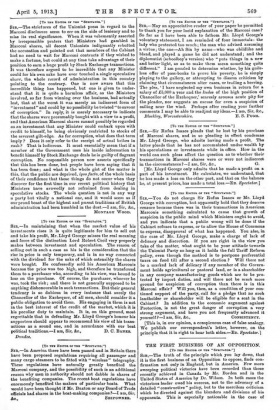[TO THE EDITOR 07 THE "SPECTATOR:]
SIR,—In maintaining that when the market value of his investments rises it is quite legitimate for him to sell out and take his profit, Mr. Lloyd George misses the real meaning and force of the distinction Lord Robert Cecil very properly makes between investment and speculation. The reason of selling out in such a case as his is the consideration that the rise in price is only temporary, and is in no way connected with the dividend for the sake of which ostensibly the shares were bought. He confessedly sold his American Marconis because the price was too high, and therefore he transferred them to a purchaser who, according to his view, was bound to lose on the purchase. Of course, the purchaser, whoever he was, took the risk; and there is not generally supposed to be anything dishonourable in such transactions. But their general tendency is so dubious in every instance that surely the Chancellor of the Exchequer, of all men, should consider it a public obligation to avoid them. His engaging in them is not in the best interest of the credit of the market, which it is his peculiar duty to maintain. It is, on this ground, most regrettable that in defending Mr. Lloyd George's honour his supporters should appear to recommend his view of his trans- actions as a sound one, and in accordance with our best political traditions.—I am, Sir, &c., D. C. BANKS. Dundee.














































 Previous page
Previous page